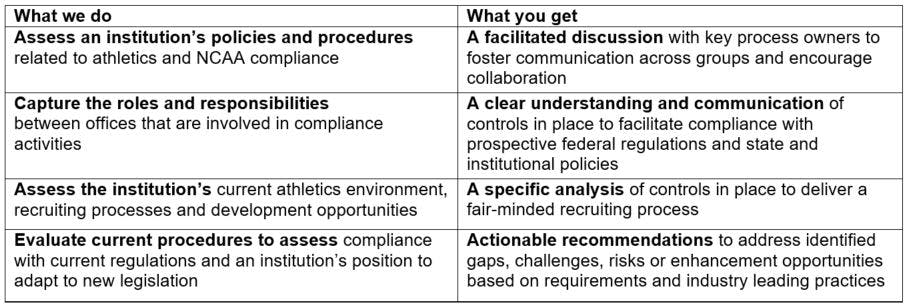
NCAA expected to waive name, image and likeness rules
Authored by Katlyn Andrews, CIA
The National Collegiate Athletic Association (NCAA) is expected to temporarily waive enforcement of its rules that prohibit student athletes from benefiting from their name, image and likeness (NIL).
At least 20 states have signed official NIL legislation into law, some of which are set to take effect as soon as July 1, 2021, that will permit players to profit from their name image and likeness. If the NCAA’s Board of Directors grants relief from existing NIL rules as it is expected to do, student athletes in all states, regardless whether legislation has been signed or has taken effect, will be able to profit from their name, image and likeness.
The NCAA, having recognized the need to modernize, has publicized its commitment to creating more flexibility in NIL rules. However, on June 21, 2021, the Supreme Court of the United States of America upheld a ruling that the NCAA was in violation of antitrust laws by agreeing to restrict the compensation offered to student athletes. While this ruling was specific to educational benefits, the decision provides an opportunity for credible antitrust challenges relating to the NCAA’s existing rules around NIL.
The move by the NCAA, or lack thereof, would allow the states and/or the institutions to enact their own policies at least until the NCAA comes out with additional guidance.
What’s happening at the institutional level?
The expansion of NIL opportunities and the absence of central guidance has left athletic directors, compliance officers, coaches and student athletes with more questions than answers. We do not know when the NCAA will release new NIL guidance or what that would look like, whether Congress will approve legislation to provide a nationwide standard, how compliance with state laws will be monitored and enforced or what lasting effects leaving NIL up to the states and individual institutions will have on collegiate athletics (e.g., recruiting).
What we do know is that colleges and universities are preparing for July 1. Many institutions have developed programs to provide student athletes with the tools and resources to capitalize on the new NIL rules. These programs, often affiliated with an institution’s entrepreneurship curriculum, educate students about building their brand, networking, evaluating and negotiating offers and may help student athletes connect with platforms and third parties that can provide NIL opportunities like endorsement and sponsorship deals.
Baker Tilly can help
We can help your institution take a proactive approach to evaluate the current state of your policies, processes, internal controls and definitions related to athletics and NIL to identify opportunities that align with the new changes.
For more information, or to learn more about how Baker Tilly can help your institution, contact our team.

